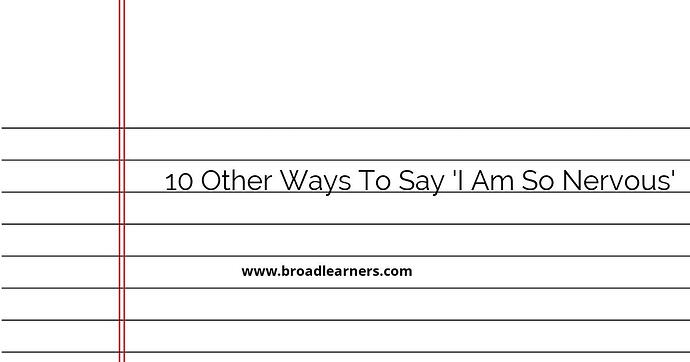Feeling nervous is a common emotion that everyone experiences at some point in their lives. It's completely normal to feel anxious or uneasy in certain situations. However, constantly saying 'I am so nervous' can become repetitive and may not effectively convey your feelings. To help you express your nervousness in different ways, here are 10 alternatives:
- I'm feeling extremely anxious
- I'm on edge
- I have butterflies in my stomach
- I'm feeling uneasy
- I'm trembling with fear
- I'm experiencing jitters
- I'm worried sick
- I'm feeling tense
- I'm in a state of panic
- I'm freaking out
Each alternative phrase captures a different aspect of nervousness. Let's explore some examples to help you understand how they can be used:
1. I'm feeling extremely anxious
When you say 'I'm feeling extremely anxious,' you're emphasizing the intensity of your nervousness. It's a powerful way to convey your level of unease in a situation.
Example: 'I'm feeling extremely anxious about the upcoming presentation. I've been practicing, but the nerves are getting to me.'
2. I'm on edge
When you say 'I'm on edge,' you're describing a feeling of being tense and easily startled. It implies a heightened state of alertness due to nervousness.
Example: 'I'm on edge about the job interview tomorrow. I really want this opportunity, and it's making me nervous.'
3. I have butterflies in my stomach
When you say 'I have butterflies in my stomach,' you're describing a fluttery sensation in your abdomen. It's a common expression used to convey nervousness, particularly in anticipation of something.
Example: 'I have butterflies in my stomach before going on stage. I hope I can overcome my nerves and give a good performance.'
4. I'm feeling uneasy
When you say 'I'm feeling uneasy,' you're expressing a general sense of discomfort or restlessness. It suggests that you're not at ease and may be experiencing nervousness.
Example: 'I'm feeling uneasy about the upcoming meeting. I'm not sure how it will go, and that's making me nervous.'
5. I'm trembling with fear
When you say 'I'm trembling with fear,' you're emphasizing the physical manifestation of your nervousness. It indicates that you're so nervous that your body is visibly shaking.
Example: 'I'm trembling with fear before the big exam. I've studied, but my nerves are getting the best of me.'
6. I'm experiencing jitters
When you say 'I'm experiencing jitters,' you're describing a feeling of nervousness or unease. It's often used in situations where you feel a combination of excitement and anxiety.
Example: 'I'm experiencing jitters before the first day of my new job. I'm excited, but also nervous about starting.'
7. I'm worried sick
When you say 'I'm worried sick,' you're emphasizing that your nervousness has reached a point where it's affecting your physical and mental well-being. It suggests extreme anxiety or distress.
Example: 'I'm worried sick about the outcome of the interview. I really need this job, and the uncertainty is eating me up.'
8. I'm feeling tense
When you say 'I'm feeling tense,' you're describing a state of being rigid or uptight. It implies a heightened level of nervousness that is causing you to feel physically and mentally strained.
Example: 'I'm feeling tense before the important presentation. I want to make a good impression, but the pressure is getting to me.'
9. I'm in a state of panic
When you say 'I'm in a state of panic,' you're describing an intense and overwhelming feeling of fear or anxiety. It suggests that you're experiencing a heightened level of nervousness that is difficult to control.
Example: 'I'm in a state of panic before the deadline. I have so much work to do, and I'm afraid I won't be able to finish on time.'
10. I'm freaking out
When you say 'I'm freaking out,' you're expressing a sense of extreme nervousness or anxiety. It's a colloquial expression that conveys a heightened emotional state.
Example: 'I'm freaking out about the upcoming exam. I don't feel prepared, and it's making me incredibly nervous.'
Remember, these alternatives can help you express your nervousness in a more varied and nuanced way. Choose the phrase that best captures your current state of mind and use it to communicate your feelings effectively.
Good luck!
Did I miss anything? Respond below
